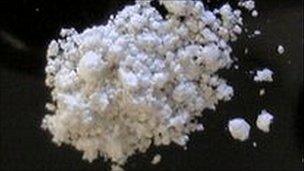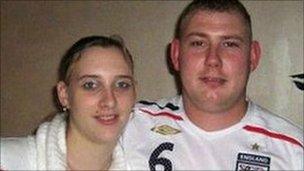Ivory wave legal high should be banned, say advisers
- Published

Ivory wave has an appearance similar to mephedrone (pictured) - both of them resemble bath salts
The government's drugs advisory body has called for a ban on the legal high ivory wave.
The Advisory Council on the Misuse of Drugs (ACMD) recommended that the substance should become a class B drug.
The substance has a similar euphoric effect to ecstasy and is sold widely online.
Earlier this year a coroner found that ivory wave may have been a "strong contributory factor" in the death of one user.
Michael Bishton, a 24-year-old chef, bought a £15 pack of ivory wave from a shop in Ryde on the Isle of Wight in August 2010.
His body was discovered after he had been seen running with outstretched arms along a cliff. Post-mortem tests showed he died of a brain injury and he had small amounts of alcohol and ivory wave in his blood.
The inquest heard he had become "bizarre and paranoid" in the days leading up to his death and doctors at a mental health unit had advised him not to take the substance.
Speaking after the coroner recorded an open verdict, Mr Bishton's mother said it was an "insult" to his memory that ivory wave had not been banned.

Michael Bishton died in 2010 shortly after buying a £15 pack of ivory wave
The ACMD said that it had now reviewed scientific evidence on the effects of ivory wave and its related compounds.
It said the National Poisons Information Service in Edinburgh had highlighted a number of cases in which users had experienced paranoia, hallucinations and "severe agitation" for up to a week after taking ivory wave.
Professor Les Iversen, chairman of the ACMD, said: "The health effects of desoxypipradrol (2-DPMP, sold as Ivory Wave) and its related compounds correspond with those related to other Class B drugs and have the potential to cause harm.
"That is why we are recommending that the government takes action to control the substance under the Misuse of Drugs Act".
The recommendation also covers structurally similar compounds, external as part of an effort to prevent alternatives being developed to circumvent the ban.
Ivory wave can look like a white crumbly powder, external and similar ingredients can be found in substances sold as ivory coast, purple wave and vanilla sky.
The drug is the sixth so-called legal high recommended for a ban by the ACMD. The government has already classified naphyrone, mephedrone (and related cathinones), Spice, GBL and BZP.
A Home Office spokesman said: "The ACMD's advice on ivory wave reinforces what we already know - that substances touted as legal highs contain dangerous and illegal substances.
"We have already taken action to ban the importation of 2-DPMP. We welcome this further comprehensive advice from the ACMD. We will consider the advice in full and respond very shortly."
- Published17 August 2010
- Published11 May 2011
- Published17 August 2010